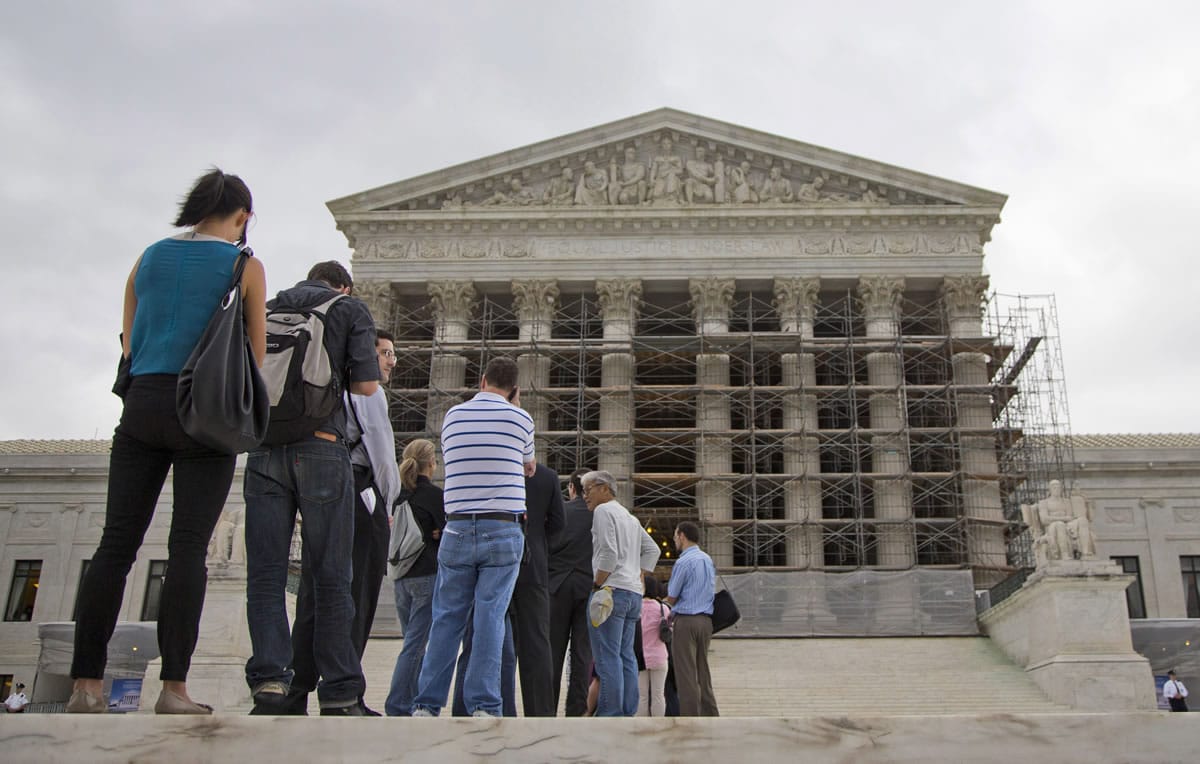WASHINGTON — Supreme Court justices who started work Wednesday with a public exhortation that “God save” the court wrestled with claims that legislative prayers violate the First Amendment.
In a closely watched case that tests government entanglement with religion, conservative justices bluntly showed support for public prayer. Liberal justices, while worrying about citizens feeling coerced by prayers conducted before public sessions, likewise voiced doubts about how the government can readily determine which prayers are acceptable and which are not.
“I don’t think this is an easy question. I think it’s hard,” Justice Elena Kagan acknowledged. “Part of what we are trying to do here is to maintain a multi-religious society in a peaceful and harmonious way. And every time the court gets involved in things like this, it seems to make the problem worse rather than better.”
The tenor of the hourlong oral argument in the case called Town of Greece v. Galloway suggested that the justices, although divided, are likely to reverse an appeals court and uphold the town’s policy of starting legislative sessions with public prayers. The biggest question appears to be what guidelines the court sets for judging future prayer challenges.
“You hear the resistance of some members of the court to sitting as arbiters of what’s sectarian and nonsectarian,” Justice Sonia Sotomayor told the attorney who was arguing for more restrictions on prayers before public meetings, “and I join some skepticism as to knowing exactly where to draw that line.”
Greece, a town of 96,000 near Rochester, N.Y., has opened its monthly town board meetings since 1999 with prayers delivered by local clergy and volunteers. During the first nine years, every public prayer was led by a Christian.
Two residents – one a Jew, the other an atheist – sued in 2008. The two women, Susan Galloway and Linda Stephens, noted that town residents attending the board meetings must sit through the prayers.
“It coerces the people who are about to stand up and ask for something from the board,” attorney Douglas Laycock told the court Wednesday.
Conservative justices dismissed the idea.
“What exactly is coercive in this environment? Having to sit and listen to this prayer?” Chief Justice John Roberts Jr. asked rhetorically. “They’re asked to participate, but not in any tangible way. Everybody’s just sitting there.”
Justice Antonin Scalia, one of six Roman Catholics on the court, was even more explicit in articulating support for prayer.
“People who have religious beliefs ought to be able to invoke the deity when they are acting as citizens,” Scalia said. “It seems to me that when they do that, so long as all groups are allowed to be in, it seems to me an imposition upon them to stifle the manner in which they invoke their deity.”
Since Galloway and Stephens sued, the town has broadened its offerings, with one session opened by a Wiccan priestess. Nonetheless, an appellate court ruled last year that a “reasonable observer” would consider the town’s prayer program “an endorsement of a particular religious viewpoint.”
In 1983, the Supreme Court decided that opening legislative sessions with prayers didn’t violate the First Amendment. Under the ruling, called Marsh v. Chambers, legislative prayer is prohibited only if the government acts with “impermissible motive” in selecting prayer-givers or uses the prayers to promote one religion or denigrate another.
The Senate and the House of Representatives have opened their daily sessions with prayers for more than 200 years. The court itself kicked off the oral argument with a public exhortation that “God save the United States and this honorable court.”
“The history of this country from its very founding has recognized the propriety of legislative prayer,” attorney Thomas G. Hungar, representing the town of Greece, told the court Wednesday.
Justice Anthony Kennedy, the potential swing vote, stressed doubts about the wisdom of requiring government officials to wade through prayer specifics to ensure that no particular sect or denomination is being promoted, warning that it “involves the state very heavily in the censorship and the approval or disapproval of prayers.”
Justice Clarence Thomas, as is his custom, was the only one of the court’s nine justices not to speak or ask questions during the oral argument.
A decision is expected by the end of June.



